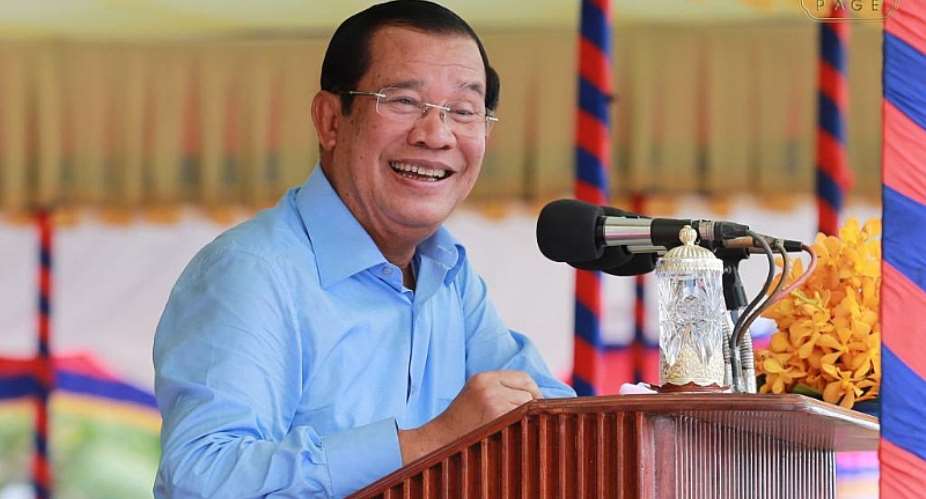Cambodia's Prime Minister Hun Sen has begun a four-day visit to China amidst cooling relations with Brussels. China is a long-term backer of Cambodia, supporting it against Vietnam under Khmer Rouge rule, and more recently it is interested in Cambodia's strategic position in southeast Asia.
Hun Sen's arrival in Beijing on Sunday came just days after the EU reinstated "normal" customs duty on rice imports from Cambodia. As of 18 January, it will pay 175 euros per tonne, to be reduced progressively over three years.
Before this weekend, Cambodia benefitted from the EU's Everything But Arms (EBA) trade scheme, which grants duty-free access to the world's least developed countries.
The European Commission found that increased imports of Cambodian Indica rice had caused economic damage to the rice sector in Europe, represented by eight southern European countries from Portugal to Bulgaria.
Rice imports from Cambodia and Myanmar rose from 9,000 tonnes in 2012 to 360,000 tonnes in 2017, causing a collapse of rice prices.
Human rights
The EU also strongly criticises Cambodia's human rights record after its Supreme Court dissolved the opposition Cambodia National Rescue Party.
In China, Hun Sen may find a more suitable partner.
On the diplomatic field, China adheres to a strict "non-interference" in third countries' "internal affairs," and is unlikely to complain about Cambodia's human rights situation.
And in trade, Beijing's rice imports may make up for possible losses caused by the EU's re-imposition of tariffs.
With 1.4 billion mouths to feed, China is the worlds' largest rice importer, with $1.8 billion worth of imports in 2017.
Cambodia's rice exports to China were already exploding, up 431 percent since 2013, with exports worth $101 million in 2017, making it China's third largest rice importer.
Belt and Road benefits
Meanwhile Cambodia, strategically located on the Indo-Chinese peninsula, is an attractive location for Chinese companies to invest in projects that are part of the "Belt and Road" project, a trillion-dollar infrastructural project that spans from South-East Asia to Djibouti.
Last Monday, Hun Sen attended the opening ceremony of Phnom Penh's third ring road – a 53 kilometre, $273 million project partly backed by Chinese government funding.





 There’s nothing you can do for us; just give us electricity to save our collapsi...
There’s nothing you can do for us; just give us electricity to save our collapsi...
 Ghanaian media failing in watchdog duties — Sulemana Braimah
Ghanaian media failing in watchdog duties — Sulemana Braimah
 On any scale, Mahama can't match Bawumia — NPP Youth Organiser
On any scale, Mahama can't match Bawumia — NPP Youth Organiser
 Never tag me as an NPP pastor; I'm 'pained' the 'Akyem Mafia' are still in charg...
Never tag me as an NPP pastor; I'm 'pained' the 'Akyem Mafia' are still in charg...
 Your refusal to dedicate a project to Atta Mills means you never loved him — Kok...
Your refusal to dedicate a project to Atta Mills means you never loved him — Kok...
 2024 elections: I'm competent, not just a dreamer; vote for me — Alan
2024 elections: I'm competent, not just a dreamer; vote for me — Alan
 2024 elections: Forget NPP, NDC; I've the Holy Spirit backing me and nothing wil...
2024 elections: Forget NPP, NDC; I've the Holy Spirit backing me and nothing wil...
 2024 elections: We've no trust in judiciary; we'll ensure ballots are well secur...
2024 elections: We've no trust in judiciary; we'll ensure ballots are well secur...
 Performance tracker: Fire MCEs, DCEs who document Mahama's projects; they're not...
Performance tracker: Fire MCEs, DCEs who document Mahama's projects; they're not...
 Train crash: Railway ministry shares footage of incident
Train crash: Railway ministry shares footage of incident
